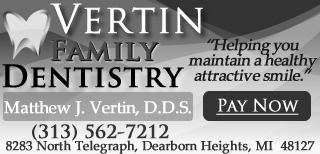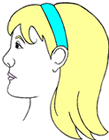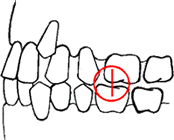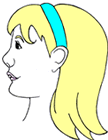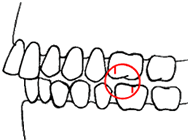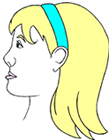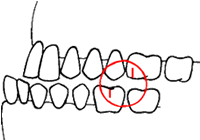|
Mal - occlusion literally means "poor closing"
or "bad bite." A bad bite can be caused by several
factors:
Dental malocclusion
A dental malocclusion occurs when the teeth are not lined
up properly, even though the jaws may be properly aligned.
|
|
|
|
Dental malocclusion caused by crowding
|
Skeletal malocclusion
A skeletal malocclusion occurs when the upper and lower jaws
don't line up correctly.
|
|
|
Overbite: Upper jaw protrudes or lower jaw recedes
(or both).
|
|
|
|
|
Underbite: Lower jaw protrudes.
|
Bad Habits
Your teeth are not as fixed in place as you might think!
Just as a constant breeze can cause a tree to grow at an angle,
repetitive forces on your teeth can cause them to become "out
of alignment."
- Thumbsucking can lead to an open bite.
- Tongue thrusting (pushing your tongue against your teeth)
can slowly, but surely, move your teeth out of alignment.
- Fingernail biting, or habitually biting or chewing on
most objects, can cause worn teeth.
- Mouth breathing: Breathing primarily through your mouth
instead of your nose can dry out the tissues of your mouth
leading to swollen and irritated gums. Also, the unnatural
jaw alignment of mouth breathing creates and imbalance that
can lead to a malocclusion. If mouth breathing is caused
by blocked nasal passages, the obstruction must be corrected
as well to prevent a relapse.
Grinding Teeth (Bruxism)
Severe cases of grinding teeth
(bruxism) can also change the occlusion. Most people who grind
their teeth do so in their sleep and therefore may be unaware
of the problem.
Missing Teeth
Primary (baby) teeth that are prematurely lost due to decay
or injury sometimes necessitate the use of a spacer to keep
the surrounding teeth growing straight until the permanent
tooth erupts to replace the missing tooth. If missing permanent
teeth are not replaced with implants,
a bridge, or a partial
denture, the adjacent teeth can "tip" into the
empty space and the opposing teeth can "super-erupt"
meaning they grow longer than is natural.
Correcting a malocclusion
Of course, more than one of the above factors may be involved,
so it is important to obtain a professional evaluation. Left
untreated, a malocclusion not only affects the patient's appearance,
it can also lead to TMJ problems and
an increased risk of decay and
gum disease.
Dr. Vertin
evaluates each individual case to determine the best course
of action to prevent or cure the malocclusion.
|
